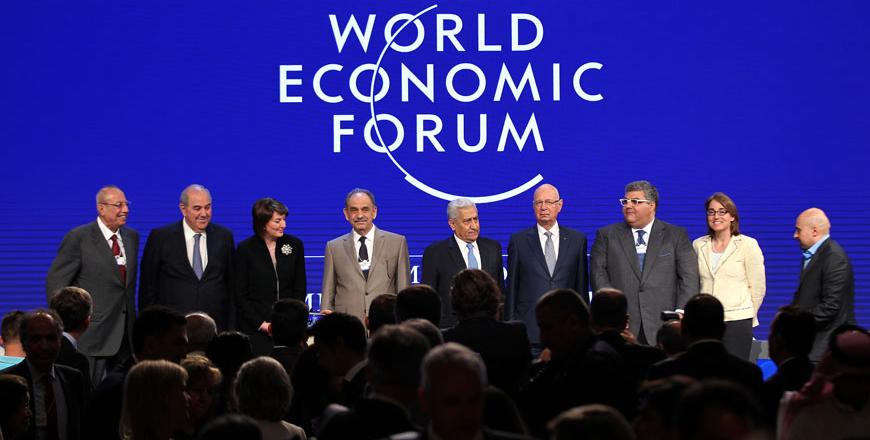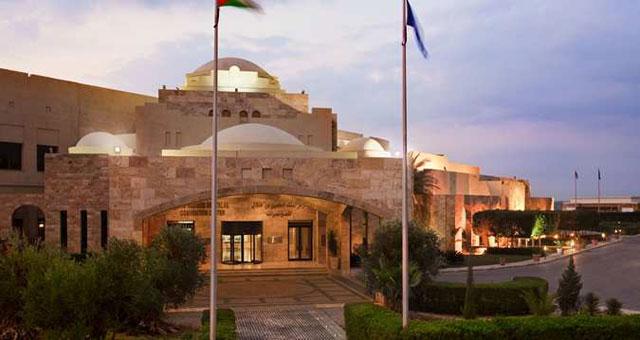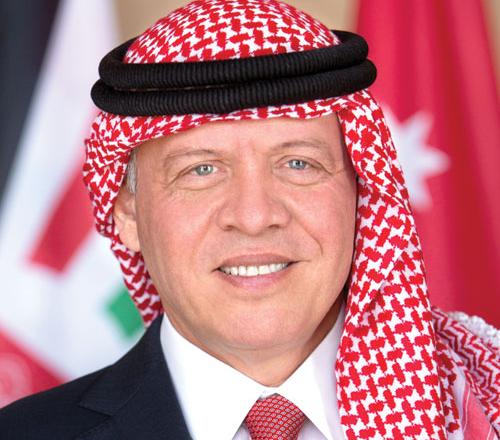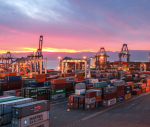You are here
WEF participants underline regional growth potential as forum concludes
By Mohammad Ghazal - May 23,2015 - Last updated at May 23,2015

Prime Minister Abdullah Ensour poses for a group photo at the conclusion of the World Economic Forum on the Middle East and North Africa at the Dead Sea on Saturday (Photo by Raad Adaileh)
DEAD SEA — The World Economic Forum on the Middle East and North Africa (WEF-MENA), which witnessed the signing of deals worth multibillion US dollars, concluded on Saturday.
At the concluding ceremony Klaus Schwab, founder and executive chairman of WEF, voiced appreciation for Jordan's efforts for hosting the forum.
He announced that next year's forum will be held in Egypt’s Red Sea Resort of Sharm El Sheikh.
Organisers of the forum announced a final declaration at the closing ceremony in which they underlined Athe successt of the event.
The forum addressed several political and socio-economic challenges facing the region. It also resulted in several key projects and investments in different fields, the declaration indicated.
Several initiatives to create jobs and reduce unemployment were launched during the forum, it added.
The declaration indicated that in spite of all challenges in the region there is large room for growth.
Jordan signed deals worth about $7 billion in different sectors during the event, attended by more than 1,000 participants from more than 60 countries.
The Kingdom signed an agreement with British Gas Corporation to buy natural gas over 20 years; it also signed another deal with Green Watts for a $174 million wind energy project.
In addition, the country signed a deal with China’s Hanergy for solar and wind projects with a total capacity of one gigawatt at a total cost of $1.5 billion.
In addition to the special programme on countering violent extremism, Jordan used the forum as a platform to kick off the “Jordan Relaunched” campaign to revitalise its economy and attract investments. The government announced new investment opportunities worth $20 billion, aimed at creating 180,000 new jobs.
Those projects include the 973km Iraq-Jordan pipeline at a cost of $3 billion on the Jordanian side $2 billion for crude oil and $1 billion for liquefied natural gas (LNG).
The pipeline aims at pumping 1 million barrels per day of crude oil from Iraq's Haditha to Jordan's port city of Aqaba and 138 million cubic feet of LNG per minute capacity. It also includes the construction of five pumping stations and a 7-million-barrel capacity storage tank in Aqaba.
Other large-scale projects announced include solar and wind power schemes, 200-megawatt (MW) wind farms in the north and east of Jordan and 700MW solar plants in the south and east. The cost of the investments is estimated at $1.5 billion.
Other schemes include a $550 million uranium production facility in central Jordan and a $1.5 billion oil shale surface retorting in central and southern Jordan that focuses on electricity generation and oil production.
WEF-MENA took place at the Dead Sea in Jordan May 21-23. This year’s event marked the forum’s ninth meeting in Jordan and the 16th meeting in the region, held under the theme “Creating a Regional Framework for Prosperity and Peace through Public-Private Cooperation”.
“We met against the backdrop of a number of deep political, economic and societal transformations, which this region has witnessed over the past four years,” said Miroslav Dusek, senior director and WEF’s head of MENA, in a summary of the meeting.
He was quoted in a press statement as saying: “In the midst of all this turmoil, the different peoples of MENA continue to struggle to find an answer against the multiple challenges facing this region, especially the continuous demands of its young women and men for dignity and economic inclusion.”
At the meeting, WEF’s Regional Business Council (RBC) for MENA set out on a new phase of its new vision for the Arab Employment Initiative “which aims to invest in the continuous learning, training and job-readiness of the region’s youth through collaboration among businesses, educational institutions, civil society and governments. Nine founding partners from across the region committed to scaling their corporate initiatives or creating wholly new initiatives aimed at closing the skills gap in the region,” the statement said.
Collectively, these initiatives will offer skilling opportunities to 49,000 people. These commitments meet nearly 50 per cent of the RBC’s target of skilling 100,000 young people by 2017, it added.
Related Articles
AMMAN — The government announced Friday the establishment of the National Competitiveness Council, which will be chaired by Prime Minister A
The World Economic Forum on the Middle East and North Africa (WEF-MENA), which will be held on the shores of the Dead Sea May 21-23, will feature a special session on Jordan titled “Jordan Relaunched”.
His Majesty King Abdullah has said that regional problems would not prevent Jordan from moving ahead with its development plans, adding that crises in the neighbourhood have always been a driver for progress as far as the Kingdom is concerned.


















